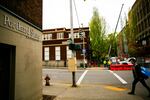
Cranes and construction crews have become a regular sight at Portland State University's downtown campus.
Rob Manning / OPB
It's not often a university suggests a new research effort could potentially change the world. PSU says two of its own might.
"Both of these centers have the potential for literally changing the world, and I don't say that casually," said Mark McLellan, PSU's vice president of research.
The two centers are the PSU Homelessness Research and Action Collaborative, co-led by professors in the urban planning and public health disciplines, and the PSU Digital City Testbed Center, led by a geology professor. Both centers boast at least 20 faculty members as part of a multi-disciplinary effort to use research to confront big urban problems. PSU leaders have pledged $3 million in startup funding to cover the centers' first three years.
Marisa Zapata, associate professor of urban studies & planning, will co-direct the homelessness center. She said efforts start with an examination of homelessness among students and staff at PSU. Zapata said the center will also challenge community assumptions about the complicated issues around housing insecurity.
"We know that most people agree that homelessness is one of the most pressing issues in our country and in Portland today," Zapata said. "However, we disagree about why homelessness exists and how to solve it."
Zapata said the homelessness center will support PSU faculty who are involved in designing and building solutions for people who lack shelter, such as temporary villages. The center faculty will also study budget options aimed at making best use of limited public and private dollars. Zapata said some solutions are known to help, but need further vetting on the ground.
"I think we know that there are a lot of good solutions out there, but because we haven't fully invested in them, we don't know that they're actually going to work," Zapata said.
While the PSU Homelessness Research and Action Collaborative is focused on the complicated social issue of homelessness, the other center seeks to explore the many interactions between technology and urban communities.
"What we plan to do with this center is look at the issues of how technology affects cities — how it affects city operations, but also the lives of residents of cities," said center Director Jon Fink.
Fink said technology has the potential to improve numerous aspects of urban life, but researchers have to be thoughtful about how to test out ideas.
"Do you just march into a neighborhood and say, 'Hey folks, we're bringing in all kinds of new gizmos and video cameras and other things and trust us, it'll be great?' That hasn't worked so well in a number of areas," Fink said.
The PSU Digital City Testbed Center will try out ideas in three urban areas: the Portland State University campus on the city's west side, the Oregon Museum of Science and Industry in Southeast Portland, and the University of British Columbia in Vancouver, B.C.
Fink said PSU is discussing additional partnerships with Microsoft in the Seattle area, the Oregon Zoo and Intel to become future "testbeds."
The Testbed Center will start out focusing on how technology can help with daunting city issues. Fink said the center will seek to improve how people in wheelchairs and the visually impaired navigate urban areas. Fink, as a geologist, said the center will also dig into how technology can improve a region's resilience to earthquakes.
Much as the homelessness center intends to challenge the public's view of an obvious city problem, Fink said the Testbed center plans to educate the public about what "smart cities" are.
PSU President Rahmat Shoureshi said the two centers were chosen out of 28 proposals from university faculty. Shoureshi said the winning proposals showed financial sustainability, but they won't be PSU's last such policy institutes.
"There are many future opportunities, but we want to do them right," Shoureshi said. "Take a few, show success, show progress and move forward so there will be other centers that will come."
